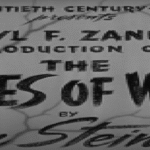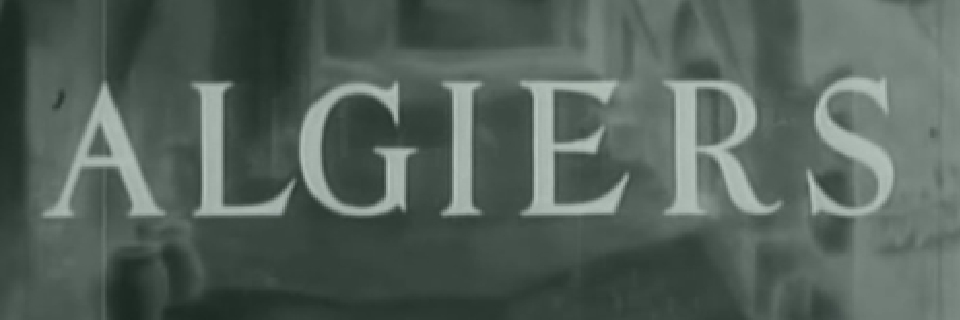Algiers is a 1938 American romantic crime drama directed by John Cromwell, adapted from the French film Pépé le Moko (1937). Set in the labyrinthine Casbah of Algiers, the film combines elements of noir, melodrama and romantic fatalism, encapsulating the exoticist Hollywood vision of North Africa in the interwar years. The film stars Charles Boyer as the enigmatic criminal Pépé le Moko, and introduces Hedy Lamarr, in her first American role, as Gaby, the Parisian socialite who becomes the object of his doomed affection.
The film opens with a striking contrast between two worlds: the bustling, chaotic energy of the Casbah and the ordered, colonial presence of French authority in the city below. The Casbah, a dense, almost impenetrable quarter of Algiers, is depicted as a world unto itself, filled with intrigue, danger and concealment. It is here that Pépé le Moko, a suave and intelligent jewel thief, has taken refuge after a major heist in France. Though he is wanted by the authorities, the Casbah protects him, its winding alleys and loyal inhabitants shielding him from capture. For two years he has evaded the law, becoming both a legend and a prisoner of his own freedom.
Inspector Slimane, played with quiet resolve by Joseph Calleia, is a subtle and cunning adversary. Unlike the brutish police captain who favours brute force, Slimane understands that Pépé cannot be taken by strength alone. Instead, he waits, observing his quarry patiently, believing that it is only a matter of time before Pépé’s longing for the world outside the Casbah, particularly Paris, will lure him out into the open. Slimane’s method is psychological rather than physical; he knows that nostalgia, memory and desire are more effective than weapons.
Pépé is surrounded by a colourful cast of characters. There is Regis, an opportunist and informer, who poses a constant threat to his safety. Carlos, Pépé’s loyal friend and comrade, helps maintain order within the Casbah and acts as a voice of reason. Inès, played by Sigrid Gurie, is Pépé’s mistress, a woman deeply devoted to him but increasingly aware of his emotional withdrawal. Her love for him is sincere, but it cannot compete with the romantic ideal that begins to consume him.
That ideal takes shape in the form of Gaby, a beautiful and elegant tourist from Paris. She arrives in Algiers with her wealthy lover, a middle-aged businessman, and is drawn to the Casbah out of curiosity. It is here that she meets Pépé, and a powerful connection is forged almost instantly. Gaby represents everything Pépé has lost: Parisian sophistication, freedom, and a life untainted by crime or exile. For Gaby, Pépé is an exotic figure, dangerous and romantic, a man who stands in sharp contrast to the predictable world she knows.
Their romance is marked by a fatalistic undertone from the beginning. Though their chemistry is undeniable, both characters are trapped – Gaby by her societal role and obligations, and Pépé by his criminal past and the geographical confines of the Casbah. The more they interact, the more Pépé becomes obsessed, envisioning a return to Paris and a fresh start. Yet this dream is more illusion than possibility, and Slimane, ever watchful, sees an opportunity.
The plot thickens as Regis discovers Pépé’s growing vulnerability and attempts to exploit it by colluding with the police. In a desperate attempt to lure Pépé out, a plan is devised involving Gaby’s return to Paris. Pépé, unaware of the trap, decides he must see her once more. Despite Carlos’s warnings and Inès’s pleading, he leaves the safety of the Casbah and descends into the European quarter of Algiers. It is a fatal mistake.
The climax of the film unfolds at the harbour, where Pépé hopes to reunite with Gaby before she boards the ship. But Slimane, ever calculating, intercepts him. Pépé is arrested, and though his capture is conducted with a sense of melancholy dignity rather than triumph, it seals his fate. As he is taken into custody, he catches a glimpse of Gaby aboard the ship, unaware that she had returned to see him one last time.
In the final moments of the film, overcome with grief and realising he will never be free again, Pépé takes his own life. The tragedy is complete – his dream of love, of escape, of redemption, dies with him. The film ends with a sense of inevitable loss, echoing the themes of entrapment, longing and unattainable freedom that pervade its narrative.
Algiers is notable for several reasons. It was the American public’s first introduction to Hedy Lamarr, whose screen presence was immediately recognised as striking and original. Her portrayal of Gaby is understated but evocative, representing both allure and the impossible dream of salvation for Pépé. Charles Boyer, already an established star, delivers one of his most iconic performances. His Pépé is charming, intelligent and tragic, a man shaped as much by his charisma as by his circumstances.
The film’s atmospheric depiction of the Casbah, with its narrow passageways, hidden alcoves and shadowy interiors, contributes significantly to the mood. Though filmed in Hollywood, the production design successfully creates a sense of place that feels both exotic and claustrophobic. The Casbah is more than a setting – it is a character in its own right, embodying the paradox of freedom and imprisonment.
Algiers also introduced a line that became famous in cinematic history – “Come with me to the Casbah” – although, curiously, it was never actually spoken in the film. Nevertheless, it became indelibly associated with Charles Boyer and the romantic mystique of the picture. The line was later parodied and referenced widely, further cementing the film’s place in popular culture.
Stylistically, Algiers bridges the gap between poetic realism and film noir. Its use of shadow and light, its morally ambiguous characters, and its exploration of identity and fate mark it as a precursor to the noir films of the 1940s. The film also raises subtle questions about colonialism, though it largely focuses on the European characters’ emotional dramas rather than on the political realities of French Algeria.
Algiers is a romantic tragedy wrapped in the cloak of a crime drama. Its central figure, Pépé le Moko, is a man torn between past and present, safety and risk, love and loss. Through its haunting atmosphere, compelling performances and rich emotional texture, the film remains a poignant meditation on longing, exile and the illusions of escape.







